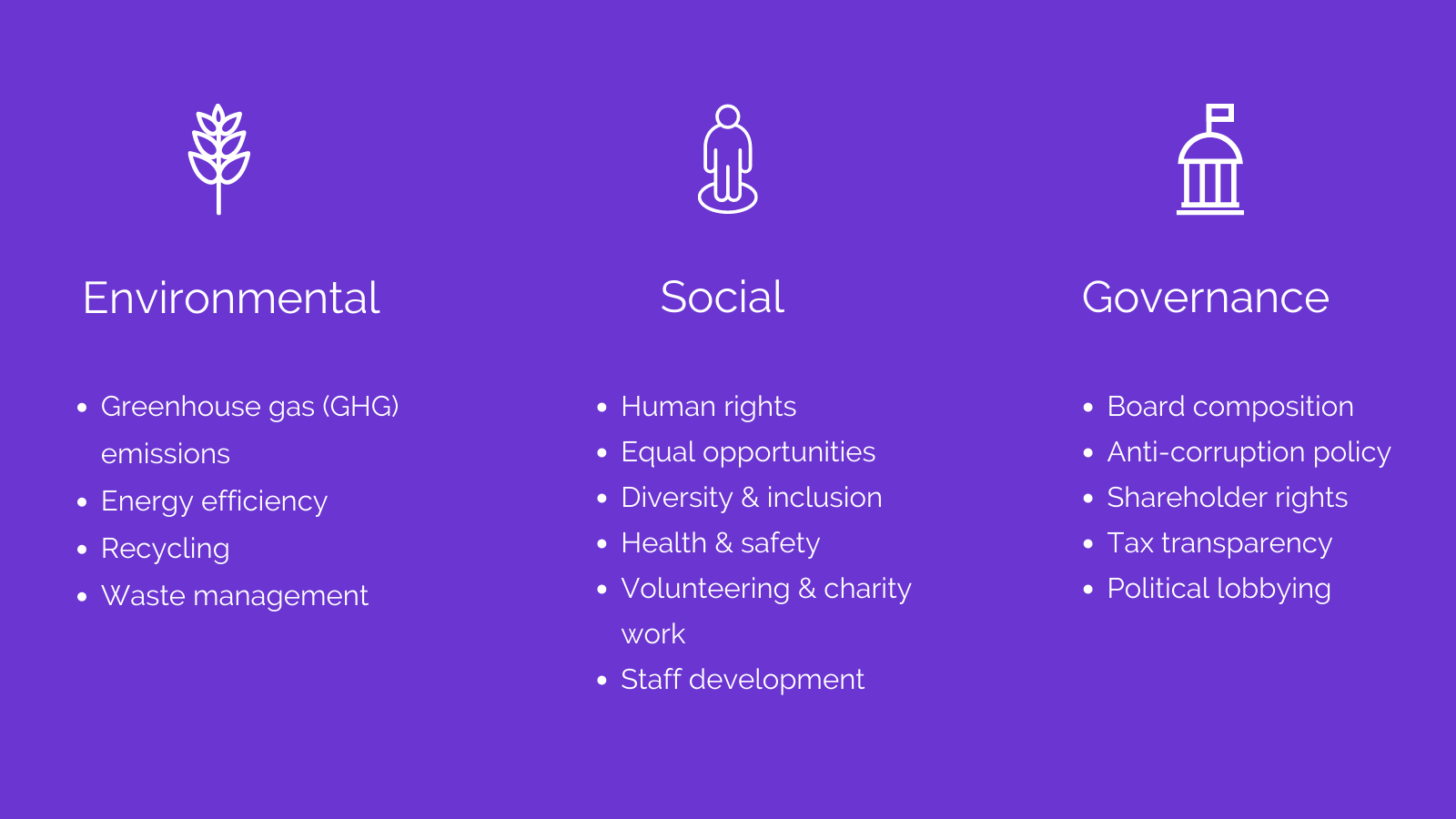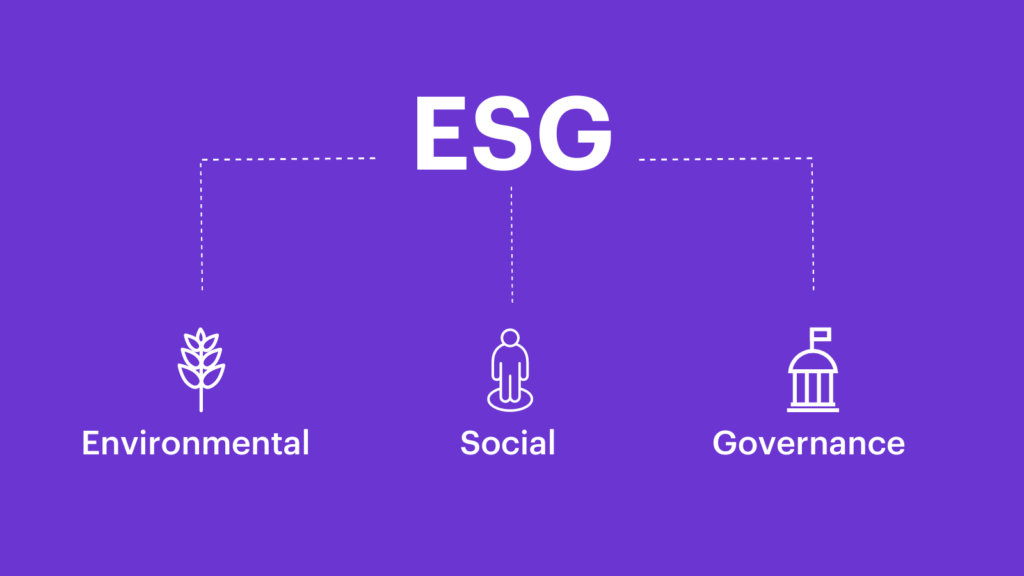In the last few years Environmental, Social and Governance (ESG) has become a bit of a buzz term in the industry, in many ways overtaking its predecessor Corporate Social Responsibility.
In essence, ESG is a measure of how much ‘goodness’ a company is putting out into the World. Is it being a responsible caretaker of the planet? Considerate and kind to its employees? Is its management trustworthy and transparent?
Conceived in investment circles due to the growing number of millennial investors, the trend has expanded in recent years to the general consumer. More than ever, we are becoming hyper-aware of the ethics behind a company before we decide to invest money, time or effort into their services. We’re asking whether purchasing a product from one company over another, is the more ‘ethical choice’. We want the companies we buy from to share the same values as us.
According to Accenture Strategy’s Global Consumer Pulse Research, 6/10 young people closely consider the ethical values of a company, before buying.

It’s worth noting here that ESG is not a box-ticking exercise (even though it may look that way), it goes much further than that. A successful ESG strategy needs to implement a change in company culture. This means, these policies need to be sewn into the company fabric, they need to be agreed on and followed by the staff because they care about them – not because it’s obligatory. ESG initiatives must be driving real world results, and so companies need a system in place that encourages employees to support activities related to ESG, whether that’s volunteering, sustainability initiatives, or mentorship programmes.
It’s not to say companies are ‘unethical’ if they don’t advertise their commitment to these standards. In fact, most of the time, companies have a lot of these policies in place, they just fail to market them appropriately. Without being clear about what you do stand for, it leaves room for people to assume you don’t care… or worse, looks like there’s something you’re trying to hide.
Since the start of 2020 data shows that companies with detailed ESG strategies and are more resilient and have fared better during the pandemic.
So if you’re new to ESG, here’s a good place to start;
Environmental
Carbon emissions; studies show time and time again, that carbon emissions are the greatest concern to investors and consumers. If you haven’t already, take time to go through an environmental audit of your company. There are websites that can help with this, but first off find out what your carbon footprint is. And then understand how you can minimise it, and offset it.
Have a look at; https://www.carbonfootprint.com
Also consider;
- Your energy usage, how can you become more energy efficient, or move towards decarbonising energy sources? Are your staff using energy saving lightbulbs at home?
- Waste, what is it, where is it going? Can it be greener, recycled, reused, biodegradable? If you’re a remote company, are your employees recycling at home?
- Materials, are others available that are less harmful, or have fewer consequences for the planet?
If you’re at the beginning of your ESG journey, looking at the environmental factors is great way to start. Focusing on this issue first enables you to identify projects that reduce energy, emissions and produce clear financial ROI.
Social
The social elements of ESG are often the most challenging to companies, simply because it is harder to define what ‘good social responsibility’ looks like, and there is rarely internal consensus over what these policies should (or shouldn’t) include.
- Investors expect to see policies against the use of child labour and forced labour, as well as policies that promote Diversity and Inclusion, and Health and Safety. There is also need to see an Employee Benefits programme, good retention rates, as well as further training and development for staff.
- Ensure your Equal Opportunities policy covers all facets of diversity. This should include; race, gender, religion, transgender and non binary, sexual orientation, disability, religious belief or political opinion, as well as other ethical beliefs.
- You may also want to implement a policy that details how you care for the wellbeing of your staff. What infrastructure do you have in place to ensure they are safe and well, physically and mentally?
- Another document to include if appropriate, is a policy detailing your charitable practices. In what ways are you encouraging the culture in your company to ‘give back’? Volunteering days for example, or fundraising events?

Governance
Governance, although similarly important, tends to fare lower than the Environmental or Social aspects of ESG strategy.
- Investors looking into the governance of a company, will be interested in the diversity of the board in terms of gender, race, age and experience. They’ll also be looking to see if there is a committee set up to focus on ESG/Corporate Social Responsibility.
- Inequalities in remuneration and pay policies have come under recent scrutiny too, where the recent pandemic has meant in some companies the lower paid workers have been furloughed, or let go, while managers receive bonuses. What do you have in place to ensure this inequality doesn’t exist?
- It is important to remain transparent in the way your company is structured and governed, it may be worth implementing an Anti-Corruption policy, as well as clear graphics or diagrams to show how your company is structured, and who plays which role.
Merrill Lynch’s recent report notes that customers are looking to connect with companies that they “believe are transparent in their business practises and serve a greater social purpose”.
Key takeaways;
– Your goal is not to ‘boost’ your ESG score. Focus on moulding the culture of your business, without meaning behind it, ESG policies are simply shallow tick boxes.
– Remember, a world exists where your company can be profitable, and conserve resources. Find it!
– Allow and encourage every opportunity for your employees to do good. Design an environment where your company makes the World better by being in it. Inject goodness, not only for your customers, but for your employees, their families, and the communities you interact with.
Looking for examples of ESG frameworks? You can find the SchemeServe ESG policies here.


